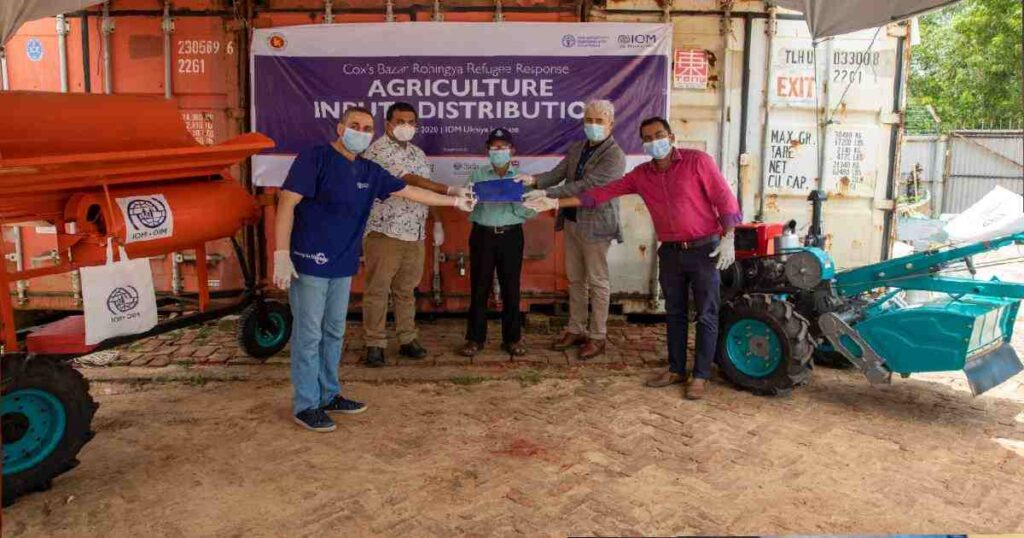The Food and Agriculture Organization of the United Nations (FAO), and the International Organization for Migration (IOM), in partnership with the Department of Agricultural Extension (DAE), on Monday distributed agricultural machinery and rice seed as part of a joint emergency response to the coronavirus pandemic.
The machinery, including power tillers, threshers, and diesel generators, will benefit 500 farmers who belong to 25 farmer groups in Ukhiya.
They will receive full training to use the machinery, as well as financial investment advice, and technical training aimed at boosting production. DAE will be responsible for providing operational support, said IOM.
In addition, around 24,000 farmers will receive rice seed and household hygiene items from FAO while IOM will provide 48,000 cloth face masks. The face masks and hygiene kits, which include soap for hand washing, will help protect the farmers from catching COVID-19 while at work.
The emergency assistance, which is line with government priorities on supporting agriculture and food security, will provide much needed support to farmers who have been dealing with the combined impact of the coronavirus and Cyclone Amphan.
Movement restrictions imposed to restrict the spread of COVID-19 have caused labour shortages on farms and also meant that farmers have found it difficult to buy agricultural inputs, including more expensive items such as machinery.
“This joint effort from two UN agencies will support government efforts to improve agricultural production at an important and sensitive time,” said Robert D. Simpson, FAO Representative in Bangladesh.
He stressed that FAO is committed to supporting increased agricultural mechanisation as a means to boost productivity and support food security.
He added: “Some 500 farmers will have access to the machinery that we are distributing today.The machinery will help safeguard farmers against COVID-19 because they will not be so reliant on hiring labour, which may be in short supply.
Machinery makes it possible to produce more food much more efficiently and is key to the country’s long-term food security.
‘Support to continue’
Patrick Charignon, Head of Transition and Recovery Division, IOM Cox’s Bazar, praised the collaboration. He said: “FAO and IOM have been working together closely since the beginning of the Rohingya crisis, in coordination with government. The partnership of the two agencies is highly recognized at a global level. We will continue supporting affected populations and expand areas of collaboration.”
The UK is supporting the agro-machinery distribution while Canada, Sweden, and the Netherlands are funding FAO for seed distribution and capacity building of farmers.
“The Government welcomes this joint partnership that addresses agricultural needs of local farmers during lockdown and COVID-19. This support will ensure food security and economic improvement of the upazila,” said Abul Kashem, the Deputy Director, Department of Agricultural Extension, Cox’s Bazar.
“Supporting farmer groups through mechanisation is one of the successful livelihoods programmes in the Upazila. I hope this exemplary activity can benefit marginalised farmers as an example of effective community-driven agricultural intervention which can increase productivity of not only the own communities but also neighbours,” said Md Nikaruzzaman, Upazila Nirbahi Officer, Ukhiya.
FAO and IOM continue to strengthen cooperation at the global and national levels to meet the needs of Rohingya and the host community in Cox’ Bazar and across Bangladesh.
Along with the World Food Programme, they implement the Safe Access to Fuel and Energy Plus Livelihoods (SAFE Plus) project.
The project addresses environmental degradation through avenues such as distribution of liquefied petroleum gas (LPG) and stoves, reforestation, and improved access to food production through livelihoods programming.
source: UNB




